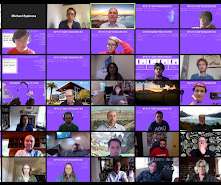Mini observations on digital civil society as we're living it right now
Philanthropy 2173
APRIL 23, 2020
These days I'm not just writing and teaching about digital civil society, I'm watching as people all around me come to realize they're living it everyday. I'm sitting in on seminars at universities in other countries. Teaching via video conferencing allows me to connect across classes, schools, and disciplines. elsewhere ).





















Let's personalize your content